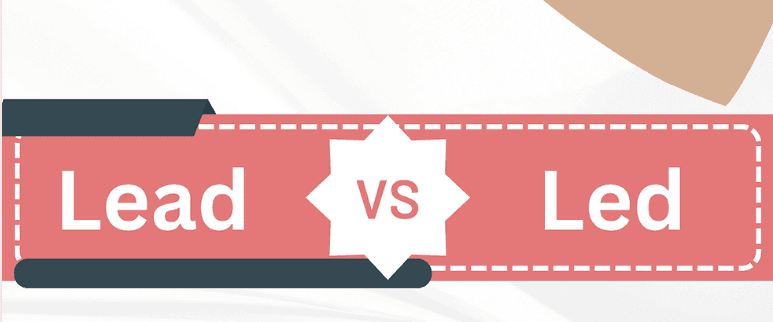Leadership Language: Understanding the Roles of Lead and Led
Contents

Picture this: You're presenting a project update to your team. Nervously, you say, "I lead the team to complete the project within the deadline." A murmur of confusion spreads across the room. You meant to use "led", not "lead".
This confusion between "lead" vs "led" is a common issue faced by many non-native English speakers in India. After all, both words sound similar, and their meanings are closely related.
These two words play a pivotal role in describing leadership roles or past events. Therefore, mastering their usage can boost your confidence and credibility in your workplace.
This blog post aims to demystify the confusion for you. We'll delve into lead vs led definition, meaning and usage so that you can avoid such errors in the future.
What is the Meaning of Lead?
The word "lead" is an intriguing one with multiple meanings in English. Predominantly, it's a verb meaning to guide or direct someone or something.
For instance, "Can you lead the meeting today?" It can also refer to being in charge or winning in a competition, like "India leads the cricket match." Lastly, "lead" can denote a type of heavy, soft, malleable metal - "This figurine is made from lead."
What Does Led Mean?
Now, let's understand 'led'. It's simply the past tense and past participle form of 'lead'. When you've already guided someone or directed an activity in the past, you use 'led'.
For example, "She led the team to victory last year."
Need more clarity on past tense forms? Check out this handy guide on Clapingo's YouTube channel for a deeper dive into past-tense rules and usage.
Understanding the Difference: Lead vs Led
One common confusion in English language usage, particularly for learners in India, is understanding when to use 'lead' and 'led'. To elucidate the lead vs led meaning, let's delve into the comparison table below:
Word | Part of speech | Usage | Example |
Lead | Verb (Present) | Directing or guiding | He will lead the team meeting tomorrow. |
Led | Verb (Past) | Past tense of leading | She led the project successfully last year. |
Following are the summarized differences in bullet points:
- 'Lead' is pronounced as /li:d/ and used when referring to present or future events.
- 'Led', pronounced as /led/, is the past tense and past participle of 'lead'.
Now, onto grammatical rules about using 'lead' and 'led':
Use ‘lead’ when you are currently guiding or intending to guide someone or something.
Use ‘led’ to describe an action that has already happened.
For instance, consider these lead vs led examples:
"I will lead the presentation at tomorrow's conference." (Future tense)
"He led us through the difficult terrain during last year's trek." (Past tense)
Practical Examples of Using Lead and Led
Let's understand 'lead' and 'led' with a couple of Indian workplace scenarios.
Scenario 1: During a presentation, Ravi says, "I have lead the project for six months." Here, Ravi incorrectly uses 'lead' instead of 'led'. The correct sentence should be: "I have led the project for six months." Remember, 'led' is the past tense of 'lead'.
Scenario 2: In a meeting, Priya states: "Our CEO will lead us to new heights." She uses the word 'lead' correctly as she talks about a future event. If she had said, "Our CEO will led us to new heights,” it would have been incorrect.
These examples illustrate the lead vs led usage in real-life situations.
Common Mistakes and Misconceptions

A frequent error non-native English speakers in India make is using "lead" (pronounced as 'leed') when they mean "led". The lead vs led meaning can be confusing as both words are closely related.
Many people incorrectly use 'lead' (pronounced as 'led') thinking it is the past tense of lead (pronounced as 'leed'). It's a common mistake due to their identical pronunciation but different spellings and meanings. For instance, on your resume, you might say, “I lead a project” when you should say, “I led a project”.
Moreover, another misconception is that these words can be used interchangeably. However, correct usage depends on whether you're referring to the present or past.
Remember these simple rules to avoid any lead vs led mix-ups in your spoken and written English:
1. ‘Lead’ for present and future actions.
2. ‘Led’ for past actions.
These are just some examples of commonly confused words in English. To avoid such errors and master English language nuances like the lead vs led distinction, exploring Clapingo's blog posts or YouTube videos on commonly confused words can be incredibly helpful.
Clapingo - Your Language Partner
Navigating the confusing maze of English language can be tricky for non-native speakers. That's where Clapingo steps in as your trusty language partner. With one-on-one personalised coaching sessions, Clapingo offers a unique learning experience designed to tackle common language pitfalls like the lead vs led dilemma. Our platform hosts native English speaker tutors who guide you through a structured course with a singular focus on fluency and correct usage.
Wrapping Up
To reiterate, distinguishing between 'lead' and 'led' - both in written and spoken English - is quintessential for your professional growth.
Remember, 'lead' in present tense refers to guidance or direction, while 'led' is the past tense of the same verb. For instance, "I will lead the prayer tomorrow" (future tense) and "I led the prayer yesterday" (past tense).
This understanding helps avoid miscommunication, particularly in professional scenarios where such mistakes may leave a negative impression You might recall these lead vs led examples when updating your resume or drafting an email.
So why wait? Start your journey towards flawless English today with Clapingo!
FAQs
1. What is the difference between 'lead' and 'led'?
While both 'lead' and 'led' are related to guidance or direction, their usage depends on tense. The term 'lead', pronounced as /li:d/, is a present tense verb meaning to guide or direct. On the other hand, 'led', pronounced as /lɛd/, is the past tense and past participle of 'lead'.
2. How do I use 'lead' and 'led' correctly in my resume?
Your resume should reflect your professional journey accurately, including your leadership roles. When describing a role you're currently in using lead vs led in a resume, use 'lead', like "I lead a team of five sales professionals". If you're discussing a past role, use 'led': "I led a project that increased revenue by 30%".
3. How can I remember when to use lead versus led?
One effective way is by recollecting that 'led' is a shorter word, just like 'past' - helping you remember it's used for past tense! Also, associating ‘lead’ with ‘read’ as they rhyme in the present tense can help.
You may want to read
11 Of The Best Apps For Improving Your English Speaking Skills
Comments
Your comment has been submitted